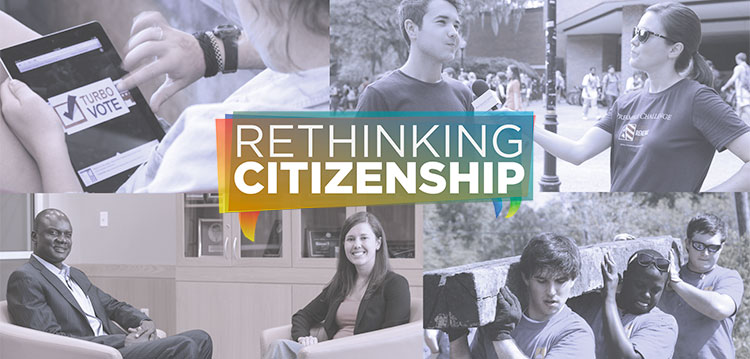Rethinking Citizenship
What does it mean to be an active and engaged citizen today?
The purpose of this interactive, digital course in civic engagement is to teach the knowledge and skills of engaged citizenship in the 21st Century and to promote thoughtful student activism for the benefit of campus, local, state, and national communities.
| Course: | IDS 2338 Rethinking Citizenship: Identity, Collaboration, and Action |
| Credits: | 3 |
| GenEd: | Social and Behavioral (S) |
| Instructor: |
Bob Graham Center for Public Service
|
What makes this course different?
Its purpose is different. The purpose of this course is less about knowledge transmission and more about fostering dispositions and developing skills. That is, instead of trying to teach students a bunch of content, the course aims to instill in them a disposition toward engagement and equip them with the skills and know-how to actually engage.
Its principles are different. This course is designed around principles related to an inclusive, 21st Century conception of civic engagement as well as innovative pedagogy and positive game play. Specifically, the course:
- Thrives on social interaction
- Promotes peer learning
- Encourages collaboration
- Values individual student identity
- Builds upon student strengths and interests
- Allows for student choice
- Provides opportunities for reflection

Its learning experiences are different. The course does not rely on video lectures, assigned readings, and multiple-choice assessments, although all of those are featured to a limited degree. Instead, students complete “Reqs”, “Challenges” and “Missions” that allow for creativity, collaborative learning, and student choice.
Its videos are different. Instead of long video lectures, the course incorporates playful promo videos for each module/topic, short and cheeky “Weekly Constitutionals” covering foundational topics in American Government, and interviews with public servants, politicians, political candidates, activists, journalists, and other renowned and well-respected citizens.
Its discussion is different. The most important discussion takes place on The Wall (civildebatewall.com), a social media tool that allows students to actively and civilly discuss important current events and issues. Students also discuss course concepts and ideas using Canvas’ discussion tool. These discussions are peer-facilitated and informed by the interviews mentioned above.
What does citizenship mean to you?
What do students do?
- Reqs. Reqs are the handful of learning tasks that all students must complete. They include introductory tasks and closing tasks, as well as tasks related to the sociopolitical issues students choose to address. Reqs are ranked Level 1, Level 2, or Level 3 based on their complexity.
- Challenges. Challenges are like assignments. Challenges are ranked Level 1 or Level 2 based on their complexity. This allows for student choice. For each Challenge module, students are presented with a menu of Level 1 and Level 2 Challenges from which they must complete one of each.
- Peer Review. Many studies have demonstrated the power of peer review as an effective learning activity. Accordingly, there are five different Reqs for which students are expected to review one of their classmates’ submissions.
- Missions. Missions are the experiential component of the course. They are potentially isolated but nonetheless meaningful opportunities for civic engagement. Missions are ranked Level 1, Level 2, or Level 3 based on the effort they demand. Throughout the course, students are expected to amass a total of 10 Mission points.
- Weekly Constitutionals. For each Module, students view a three- to eight-minute mini-lecture covering a foundational topic in American Government (e.g., the Constitution, federalism, separation of powers) and complete a short, multiple-choice quiz. They are allowed two attempts and are given feedback for their incorrect responses.
- Engagement. In addition to completing Reqs, Challenges, and Missions and reviewing the Challenges of their peers, students are expected to have an online presence and regularly participate in Canvas platform discussions as well as on the Great Civil Debate Wall.
- Civic Action Plan. The capstone learning experience for this course is the completion of a Civic Action Plan that explores a sociopolitical issue of each student’s choosing and presents a plan for addressing the issue.
*The course is exclusively online and provides three General Education credits in the Social Sciences.

